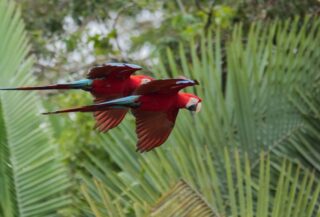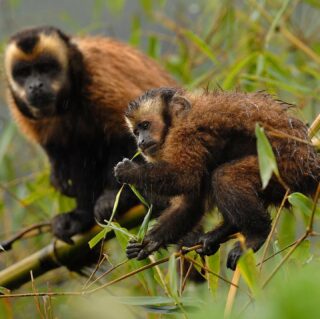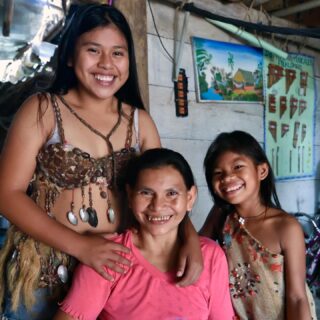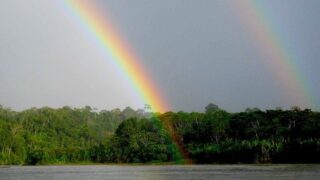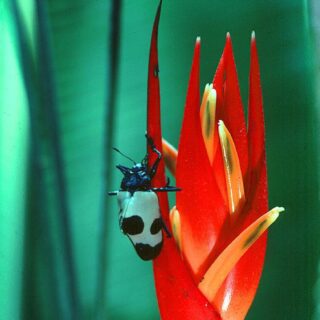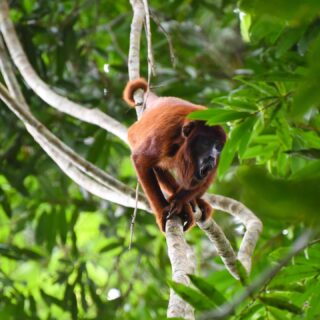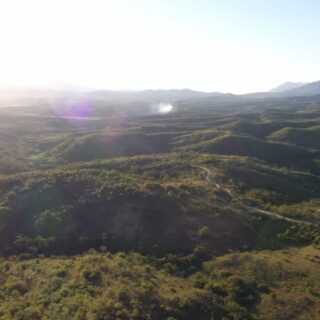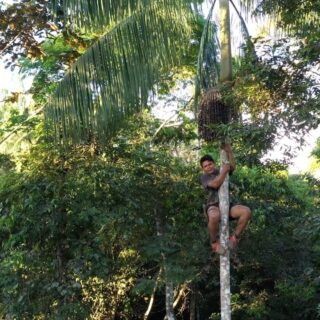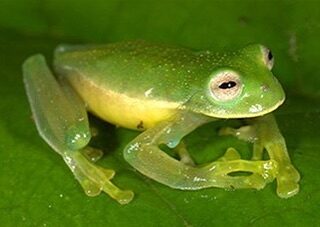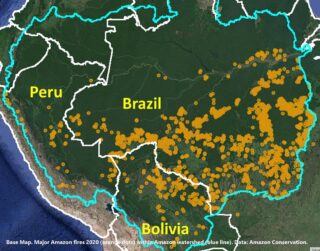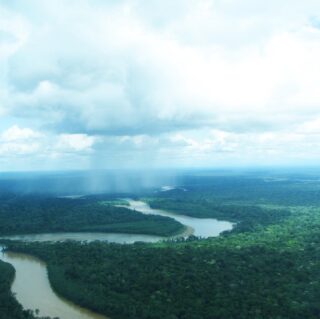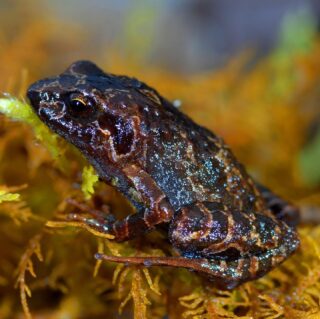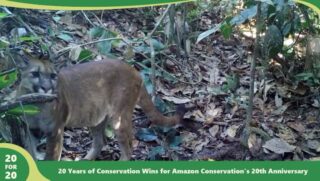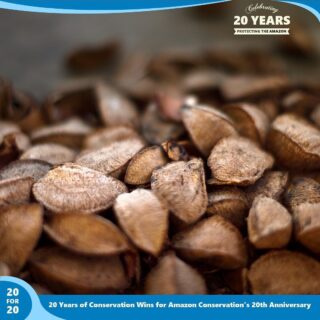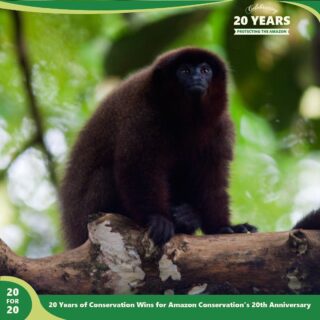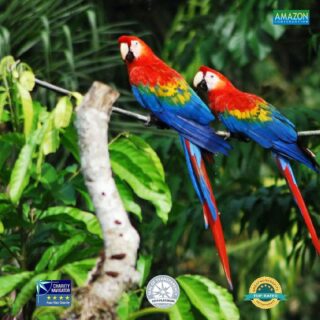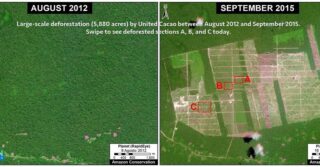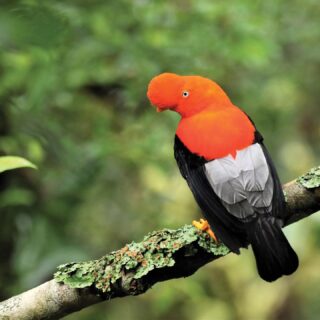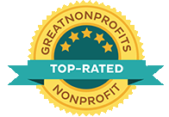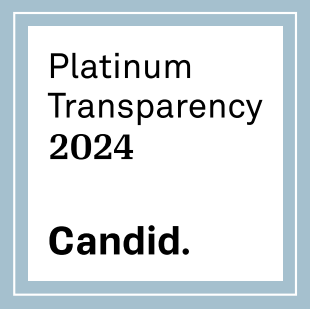With Black Friday coming up, it’s easy to be tempted by all the flashy deals and must-have products that come across our screens, but shopping sustainably is easier than you might think! There are many sustainable businesses out there that take measures to integrate sustainability into their business model, such as reducing their carbon footprint throughout their business to give back to the planet.

When Raquel Fernandes da Silva began her beauty salon business called Amazonia Concept in Amsterdam in 2022, she set out to make sure her business would make a positive impact on the planet from day one. Originating from a small town in Brazil, protecting the forest and biodiversity of her home country has always been a motivating force for Raquel. As she and her husband were developing their business plan for the salon, they reached out to Amazon Conservation to form a partnership to raise awareness about the rainforest with their clients and give back through collective donations to support reforestation and conservation efforts at the headwaters of the Amazon.
Raquel explains how Amazonia Concept strongly integrates her environmental and social ethics in all facets of the business: “It doesn’t end at simply using donations as a marketing tool, but it is important to see the full impact of your supply chain to reduce products used and reduce waste, empower people, and decrease the carbon footprint of your organization, while also educating the clientele and employees to do the same.”
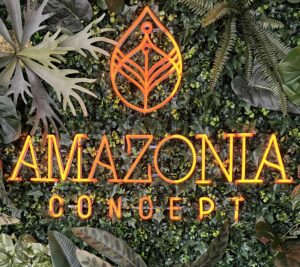 “In times of stress, it keeps me going to know that I am building careers for my colleagues and every bit of effort gives something back into the world… And I also think that we are running out of time to truly make a change, so the more we can do the better!” – Raquel Fernandes da Silva, Amazonia Concept Hair & Beauty Care
“In times of stress, it keeps me going to know that I am building careers for my colleagues and every bit of effort gives something back into the world… And I also think that we are running out of time to truly make a change, so the more we can do the better!” – Raquel Fernandes da Silva, Amazonia Concept Hair & Beauty Care
Are you a business owner looking to support a cause to help your company stand out in the Black Friday noise? Contact donations[at]amazonconservation[dot]org to discuss partnership options to fit your business model. Please note, we are not affiliated with Amazon.com, Inc.
Looking for eco-friendly businesses to support? Look to see if your favorite business is certified by 1% for the Planet in its commitment to the planet.
Instagram: @amazoniaconcept.salon & @raquelfernandes.nl
________________________________________________________________________________________________________________________________________________
Read on to learn more about what motivated Raquel to become a Business Supporter of Amazon Conservation and how she raises awareness and enthusiasm for protecting the Amazon through her business.
Can you tell us about your background and your business?
My name is Raquel Fernandes da Silva and I’m from Itamarandiba, a small town in Minas Gerais, Brazil. Growing up in rural Brazil I have always been very close to my natural environment and was able to experience the vast biodiversity in the country. My playground was the surrounding rivers and forests, with endless adventures in the local hills teaming with wildlife. Even at home with a large family, we have always placed great reliance on our natural farmstead for food and treats. This means that we were always helping our mother in the large garden that we kept, learning about sustainable farming, and helping to sell the products at farmer’s markets.
But I also had other passions. I started working in the beauty industry already during high school and have been excited by it ever since. And, most importantly, I have always had an entrepreneurial spirit. Even when I left home at 18 to move to a larger city and start studying theater and law, I always came back to running my own little shop or business to make ends meet. However, I felt limited in my chances in my home country and had an opportunity to move to Amsterdam, Netherlands with my brother. From then on, I was driven to set up my own brand of hair and beauty services here in Amsterdam and start making my own line of business successful while adhering to my social and ecological standards.
I was able to open my own business, finally, after the COVID pandemic lockdowns passed. Since the beginning of 2022, we opened the doors of “Amazonia Concept” under the motto “Where Beauty meets Nature” and have been focused on making this idea a reality ever since. It’s always been important for me to embody my culture and embed it into my life’s work. I truly believe that the culture of Amazonia Concept comes from the heart of Brazil – the essence of who I am. I feel extremely grateful that I can use my art to help transform people’s lives by focusing on inner beauty, confidence, empowerment, and self-esteem. Throughout my career as a hairstylist, my ultimate goal has always been for hair to represent the person’s true essence.
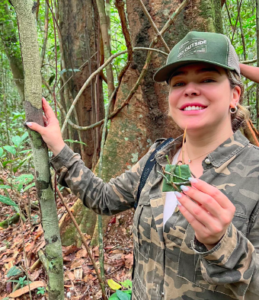 What initially inspired you to support environmental causes through your business?
What initially inspired you to support environmental causes through your business?
I am a relatively new supporter of Amazon Conservation, and the idea comes from our holistic approach to running a business in the beauty industry. We aim to create beauty through promoting health in the client, not simply focusing on short-term improvement. We aim to provide additional business support to our employees to enable them to become their own entrepreneurs within our supporting business structure. We focus on using natural products with a sustainable farming background and supporting smaller businesses rather than the mainstream product lines.
Furthermore, I try to connect directly with the communities in the Brazilian Amazon as well. For example, when I was traveling in Brazil this January with my husband to explore more ways to directly support local communities, the potential for local sustainable farming, and ways to start our own product line, we found a great way to directly support the community in Novo Airão. The small town is located directly on the Rio Negro, an older tributary of the Amazon River. Local artisans construct beautiful artwork from scrap wood from local shipworks and the proceeds directly fund childcare efforts in the village. We now display some of the artwork, trying to help sell and raise awareness about these efforts. The local network of environmental supporters in the area also helped establish transportation for potential buyers in Europe.
So the idea of supporting biodiversity and ecological protection specifically in the Amazon basin was an integral part of my business plan from the very beginning. In order to engage our clients in our collective ecological impact, we sponsor the planting of 1 tree in the Amazon Basin through Amazon Conservation for every 100 Euros spent at our salon. This has led us to sponsor almost 2000 trees through just this effort, plus we have more individual fundraisers every year for birthdays and holidays.
Why do you think it is important to protect the Amazon?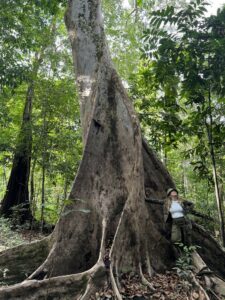
Protection of the natural beauty in my home country is something that has always been extremely important to me due to my origins and upbringing. I have witnessed the deterioration of the local environment firsthand, and it has always been my dream to use my entrepreneurial efforts for the good of the world. In times of stress, it keeps me going to know that I am building careers for my colleagues and every bit of effort gives something back into the world. I believe in the importance of the smallest components to let the biggest of us strive, the whole circle of life is beautiful to me. And I also think that we are running out of time to truly make a change, so the more we can do the better!
What stands out about Amazon Conservation compared to other organizations and why did you choose to support our work?
First off, I love the transparency and humbleness of your organization. And the approach that is placed on land conservation and ecological protection of the forest itself is what truly brought it home to me. While making our own contributions where we can on the ground, I have no doubt I will continue to support Amazon Conservation for a long time to come!
How has your business community responded to your support?
Our client base has responded extremely positively. People often ask us to report more on it, we are talking about and promoting your efforts now on our social media, and sharing as much as we can about your good work. I believe we have inspired more than a few of our customers to engage with [Amazon Conservation] privately as well!
Do you have a favorite program or initiative that stands out to you?
The use of technological advances in the protection of the forest basin is an amazing program. It helps the local communities by educating them and places powerful tools in the hands of the protectors of our lands against the corruption and disease that is a threat to biodiversity.
What would you say to other environmentally-conscious people and businesses about how they can help make a difference and help conserve the Amazon?
For any business that wants to make an impact, I believe it is vital to structure the entire economic presence to make a positive impact. It doesn’t end at simply using donations as a marketing tool, but it is important to see the full impact of your supply chain to reduce products used and reduce waste, empower people, and decrease the carbon footprint of your organization, while also educating the clientele and employees to do the same.
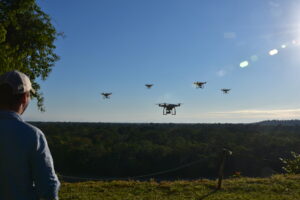
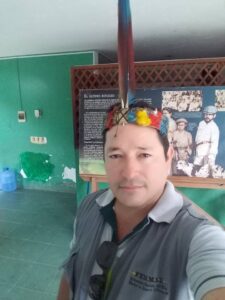 For local people like Pepe Torres, who manages the Community Monitoring and Oversight Program of FENAMAD (the Native Federation of the Madre de Dios River Region) in Peru, protecting ancestral lands is vital for Indigenous people. Indigenous leaders need the critical training and resources that we provide to defend their territories from illegal activities and land encroachment. Only once they have autonomy over their territory can Indigenous leaders focus on building climate resilience and protecting their resources for the long term.
For local people like Pepe Torres, who manages the Community Monitoring and Oversight Program of FENAMAD (the Native Federation of the Madre de Dios River Region) in Peru, protecting ancestral lands is vital for Indigenous people. Indigenous leaders need the critical training and resources that we provide to defend their territories from illegal activities and land encroachment. Only once they have autonomy over their territory can Indigenous leaders focus on building climate resilience and protecting their resources for the long term. 
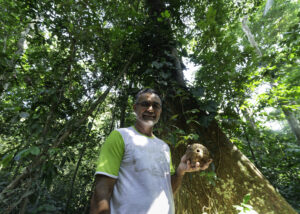 One way that you are helping meet local needs is by supporting local leader and Brazil nut harvester, Manuel Lima, from the Porvenir community in Pando, Bolivia, who has been a major force in the development of a major inter-institutional platform for producers and buyers called the
One way that you are helping meet local needs is by supporting local leader and Brazil nut harvester, Manuel Lima, from the Porvenir community in Pando, Bolivia, who has been a major force in the development of a major inter-institutional platform for producers and buyers called the 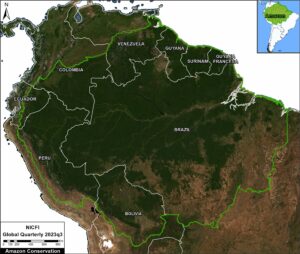 Our first MAAP report published in March 2015 looked at the escalating gold mining deforestation in the Peruvian Amazon.
Our first MAAP report published in March 2015 looked at the escalating gold mining deforestation in the Peruvian Amazon.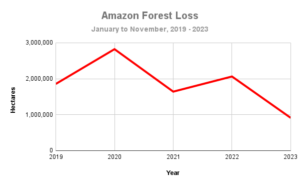

 “In times of stress, it keeps me going to know that I am building careers for my colleagues and every bit of effort gives something back into the world… And I also think that we are running out of time to truly make a change, so the more we can do the better!” – Raquel Fernandes da Silva,
“In times of stress, it keeps me going to know that I am building careers for my colleagues and every bit of effort gives something back into the world… And I also think that we are running out of time to truly make a change, so the more we can do the better!” – Raquel Fernandes da Silva,  What initially inspired you to support environmental causes through your business?
What initially inspired you to support environmental causes through your business?
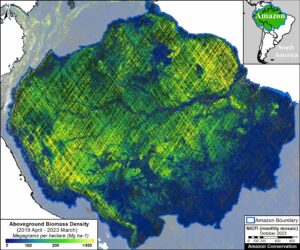
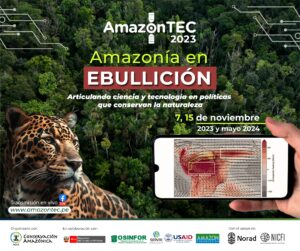
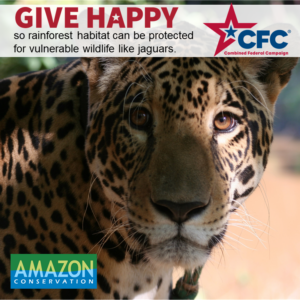 Did you know that this week’s theme for the Combined Federal Campaign is Animal Welfare Week? This week, we are asking federal employees to help us protect the habitat of all of those animals in the Amazon who cannot speak for themselves and fight to keep their homes and food sources. Give Happy and be a good steward of wildlife by donating to Amazon Conservation (
Did you know that this week’s theme for the Combined Federal Campaign is Animal Welfare Week? This week, we are asking federal employees to help us protect the habitat of all of those animals in the Amazon who cannot speak for themselves and fight to keep their homes and food sources. Give Happy and be a good steward of wildlife by donating to Amazon Conservation (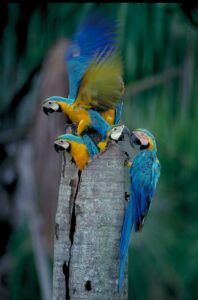
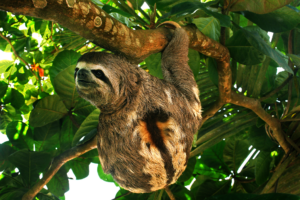 If you want to learn more about Amazon Conservation and share our work with your colleagues, consider inviting us to your CFC event!
If you want to learn more about Amazon Conservation and share our work with your colleagues, consider inviting us to your CFC event! 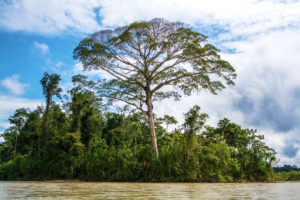
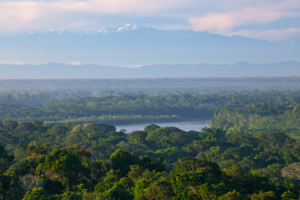
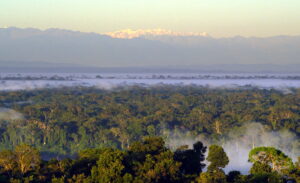
